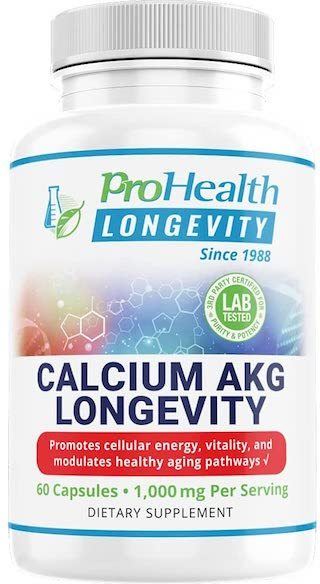CaAKG Longevity Study Shows Human Lifespan Improvement

A CaAKG longevity study shows that humans may be able to extend longevity through CaAKG supplementation, as measured by a bioage epigenetic test.
 A recent CaAKG longevity study on humans showed a reduction in biological age of eight years after taking the supplement between four to ten months.
A recent CaAKG longevity study on humans showed a reduction in biological age of eight years after taking the supplement between four to ten months.
That’s remarkable! But is the study sound, and should you be taking CaAKG?
Read on to get those questions answered.
The first thing to say is that I commend the study I’m about to explain, even if it may be flawed, because it’s hard to do longevity studies on humans; that’s why so few exist. After all, we humans live a long time and none of us want to do that in a lab. In part, this is why various animal models are used for longevity studies, often mice or rats. They can’t complain, are short-lived and have remarkably similar biology to humans. That said, although you might have dated one, humans are not rats, and thus what is really needed are longevity studies using humans.
Question: how do we do that given the aforementioned reluctance of human subjects to live their lives in a lab?
Answer: we use techniques that measure biological age and compare that to chronological age. (Read my post about that.) And that’s just what the study did that I’m about to describe.
CaAGK Longevity Study On Humans
AKG (alpha-ketoglutarate) is one of two ketone derivatives of glutaric acid. It’s a key molecule in the Krebs cycle, which is basically a big part of how we derive energy from food. Add calcium to it, and you get CaAKG.
Subscribers to this site may remember that I wrote about AKG in the May 23, 2021 Sunday Newsletter, which I also posted here so non-subscribers could also be informed about the promising healthspan benefits of supplementing with it.
The focus in that write-up was on the potential of AKG to improve healthspan — the years during which you’re healthy. At that point (May, 2021), there were no human studies published that might indicate how AKG might impact human lifespan, but now there is, and that’s a good thing, because AKG declines significantly in humans between the ages of 40 and 80.
Here’s the abstract from the Rejuvant-sponsored CaAKG longevity study published in the journal Aging on November 30, 2021 (link and bold emphasis are mine):
“The search continues for possible interventions that delay and/or reverse biological aging, resulting in extended healthspan and lifespan. Interventions delaying aging in animal models are well established; however, most lack validation in humans. The length of human lifespan makes it impractical to perform survival analysis. Instead, aging biomarkers, such as DNA methylation (DNAm) clocks, have been developed to monitor biological age. Herein we report a retrospective analysis of DNA methylation age in 42 individuals taking Rejuvant®, an alpha-ketoglutarate based formulation, for an average period of 7 months. DNAm testing was performed at baseline and by the end of treatment with Rejuvant® supplementation. Remarkably, individuals showed an average decrease in biological aging of 8 years (p-value=6.538×10-12). Furthermore, the supplementation with Rejuvant® is robust to individual differences, as indicated by the fact that a large majority of participants decreased their biological age. Moreover, we found that Rejuvant® is of additional benefit to chronologically and biologically older individuals. While continued testing, particularly in a placebo-controlled design, is required, the nearly 8-year reversal in the biological age of individuals taking Rejuvant® for 4 to 10 months is noteworthy, making the natural product cocktail an intriguing candidate to affect human aging.”
Those results are extraordinary, but I want to point out four things that I think temper the results of the CaAKG longevity study sponsored by Rejuvant:
- It was a Rejuvant-sponsored study! Rejuvant makes the CaAKG brand that was tested. Although this may or not be the case for this study, sponsors of studies own the data and can influence what gets published. Obviously, commercial sponsors want data published favorable to their commercial interests.
- It was a small study. Only 42 individuals were tested.
- CaAKG is better. Adding calcium to AKG improves the longevity outcome.
- The bioage test’s accuracy is debatable. The biological age was determined by a TruAge DNA methylation (DNAm) test, which I cover here, along with other biological testing methods. I think the results would have been stronger if other epigenetic tests in addition to TruAge confirmed the decline of bioage of eight years.
Discover Your Biological Age With These 4 Tests, Part 3: Epigenetic Age
Epigenetic age is the age your are biologically. By calendar years, you may be 50 years old, but your epigenetic age might be ten years, or any number of years, younger or older. Your epigenetic age is the only number that matters, because that’s how old (or young) you really are.
There is, however, a factoid that to my mind supports the AKG study results, and that’s the participation of Dr. Brian Kennedy, former head of the Buck Institute of Aging, one of the lead authors of the study, and professor and director of the Center for Healthy Aging at the National University of Singapore. Even though Dr. Kennedy is a scientific advisor and board member of Rejuvant, he is a credible and world renown gerontologist. He also was among the researchers in the mouse study I’ll describe in a minute. But first, watch the video where PhD student Eleanor Sheekey interviews Dr. Kennedy about AKG:
I want to see if future human studies on AKG confirm the Rejuvant results. It would be unsurprising if subsequent studies did just that, given what mouse studies indicate. For instance, in a mouse study performed at the Buck Institute, and published in Cell Metabolism (access here.), CaAKG extended the mice’s healthspans by 41%; giving them a longer life while staying healthier and disease-free, thereby suggesting CaAKG may be an ideal candidate for pro-longevity human studies, which the Rejuvant study seems to confirm.
Click here to watch Eleanor Sheekey's review of the Buck Institute AKG study
Note: CaAKG is the form of AKG that contains Ca, or calcium. Rejuvant offers two forms of their CaAKG supplement, because, they say, men and women metabolize it differently:
- For men, vitamin A is added; and
- For women, vitamin D3 is added.
My Take On Rejuvant CaAKG
These are my thoughts about supplementing with CaAKG:
- I use CaAKG (the ProHealth brand), and think the evidence is worthy of your consideration to add some CaAKG to your supplement regimen.
- If money is falling out of your pockets, try Rejuvant CaAKG for $150 for a month’s supply; otherwise, do what I do and use ProHealth’s Calcium AKG Longevity for $18.52 per month, plus either a vitamin D3 (women) or vitamin A (men) supplement depending on your gender.
Your Longevity Studies Takeaway
Remember these four things:
- Although the Rejuvant-sponsored study was small and potentially has conflict-of-interest issues, it does support larger, more rigorous mouse studies, such as the one conducted by the Buck Institute of Aging; therefore, you may elect to give it the benefit of the doubt.
- Use the formulation that includes calcium: CaAKG, as it’s more efficacious. ProHealth’s product (affiliate link) gets my thumbs up.
- Men, take your CaAKG with vitamin A.
- Women, take your CaAKG with vitamin D.
Last Updated on January 23, 2022 by Joe Garma





